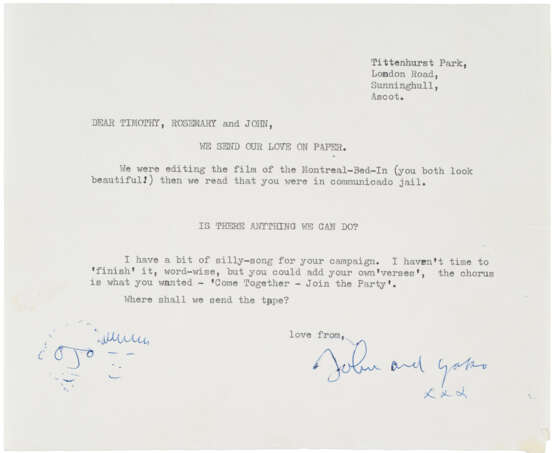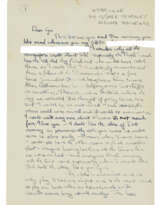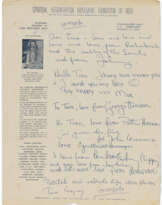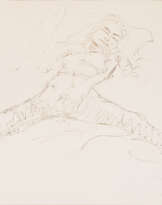ID 1236339
Lot 108 | "Come Together, Join the Party."
Valeur estimée
$ 10 000 – 15 000
Letter: one page, 165 x 203mm (light wear at bottom left corner, very light soling toward left margin). Typescript: 31 pages, 279 x 215mm (paperclip at top left still affixed, some rust stains, occassional dustsoiling).
"Come together — Join the Party"
John Lennon, Yoko Ono, Timothy Leary, on "Come Together," and the Montreal Bed-in. A remarkable letter written in response to the news that Timothy Leary, who had been running for Governor of California against Ronald Reagan, had been arrested and sent to jail after his bail was revoked in connection with a charge marijuana possession in California in late February 1970. The couple, who jointly sign the letter together with a pair of self portraits, write: "WE SEND OUR LOVE ON PAPER. We were editing the film of the Montreal-Bed-In (you both look beautiful!) then we read that you were in communicado jail. IS THERE ANYTHING WE CAN DO?" (Leary had attended the Montreal Bed-In for Peace in late May-early June 1969, where he sang on the recording of "Give Peace A Chance" with his wife Rebecca and together with Allen Ginsberg, Tommy Smothers, Dick Gregory, Murray the K, among others.) Then, Referencing Leary's gubernatorial campaign, Lennon adds that he had "a bit of a silly-song for your campaign. I haven't time to 'finish' it, word-wise, but you could add your own 'verses', the chorus is what you wanted - 'Come Together - Join the Party'. Where shall we send the tape?"
According to Steve Turner, after Leary had appeared on the recording for "Give Peace a Chance," on 1 June, a grateful Lennon asked if there was anything he could do in return, and Leary asked for a song that could be used for the campaign. "John immediately picked up his guitar and began building on the phrase: 'Come together right now, Don't come tomorrow, Don't come alone, Come together right now over me, All that I can tell you, Is you gotta be free.' After coming up with a few more version along the same lines, he made a demo and handed it to Leary. According to Turner, Leary had the song played on alternative radio stations throughout California, but to date, we have yet to locate a recording. [1] However, the present letter would call this account into question since here, Lennon announces he has Leary's campaign song on tape and asking where it should be sent—writing over eight months after the Montreal Bed-In. Complicating matters then was the fact that Leary was now in jail and facing the prospect of years in prison over two separate charges of drug possession, which derailed the 1970 gubernatorial campaign. Lennon and Ono learned of Leary's imprisonment when Rebecca Leary phoned them with the news in late February 1970 while they were editing footage of the Montreal Bed-In. Due to Leary's incarceration, this letter of support, together with John's update on the campaign song, came to the hands of Joanne Ziprin, the estranged wife of Jewish mystic Lionel Ziprin and a resident at the Leary's home in San Francisco, who was heading up the campaign to the LSD guru from jail.[2] (See lot 111 for the balance of the archive.)
Regardless of the contradictory stories, Leary was surprised to hear another song under the name "Come Together" appear on a single in the fall of 1969 following the song's recording at Abbey Road Studios that summer believed he deserved a portion of the royalties. According to Leary: "Although the new version was certainly a musical and lyrical improvement on my campaign song, I was a bit miffed that Lennon had passed me over this way… When I sent a mild protest to John, he replied with typical Lennon charm and wit that he was a tailor and I was a customer who had ordered a suit and never returned. So he sold it to someone else."[3] Lennon always maintained that the two songs were separate, explaining to Playboy in 1980: “They'd asked me to write them a campaign song. I tried and tried and tried and couldn't come up with it. But I came up with this 'Come Together,' which would have been no good for them. They couldn't have had a campaign song like that, right? But Leary attacked me years later, saying I ripped him off. Well, I had written another little thing called 'Come together and join the party...' It never got further than that. And they never came back to ask for the song. I didn't rip him off. I had the song there waiting for him.”[4] The present letter further substantiates that the two versions of "Come Together," were at best, were only loosely related.
The genesis of "Come Together, Join the Party" The letter is accompanied by a rare, contemporary photocopy of an unpublished article by Crawdaddy magazine founder Paul Williams who had accompanied the Learys to Montreal on assignment for Playboy as well as acting as Leary's campaign manager. The article, ultimately rejected for publication, chronicles the first meeting the couple had with Lennon and Ono in Montreal on the evening of 30 May 1969. Entitled, "Things we said today," the 31 page transcription, based on a now-lost audio tape of the encounter, documents the first instance of the singing of the first "version" of "Come Together," which came about spontaneously after Rebecca Leary, asked, "Has anyone told you our campaign slogan? It's, 'Come Together, Join the Party.'" Lennon chimed in suggesting "'get it together' and we say, 'we can get it together,'" With that, Lennon strummed to a crescendo shouting, "We can get IT--TOGETHER," which rapidly morphed into a chant, "We gotta come together, it's the only way to come…. Come, come, come, come together (don't go!) / Come together (come, come come come To the party…[etc.]" The germ of the song had been sown. The conversation then moves to politics and themes of Leary's campaign before the group bid farewell for the evening. Interestingly, Williams later recalled that the "tape" that Leary had referred to was actually the recording he made of that 30 May 1969 conversation: "[Lennon] did fool around with it a little on the guitar, as the conversation and good feeling continued on into the evening, and every time I’ve run into Tim Leary in the last dozen years or so, he’s asked me about the tape, no doubt thinking a tiny piece of the royalties from the Beatles’ subsequent number-one record (yeah, “Come Together”) would be a pleasant thing to have. Indeed. But I have to tell him each time, there is no more tape. I transcribed it, sent the story to Playboy under the title 'Things We Said Today,' and got a rejection, too real a conversation, not an interview at all. Lost my last copy of the transcript when I failed to get it back from another magazine editor and lost the tape when I moved to a wilderness commune and gave my copy to my most retentive collector friend, who promptly moved to a commune himself and actually let go of his burdensome possessions. It was the times."[5]
A superb letter linking some of the most important figures of the 1960s counterculture, offering additional details surrounding the composition of one of the most important songs ever recorded by The Beatles. Provenance: Joanne Ziprin – by descent to consignors.
_____________
[1] A Hard Day's Write, pp. 188-189.
[2] Jack Riley, "John, Yoko, and the New Documentary" Kairos Literary Magazine, July 2021. https://kairoslit.com/2021/04/07/john-yoko-and-the-new-documentary/ (Accessed 27 May 2024).
[3] Ibid.
[4] January 1981.
[5] (Paul Williams, [Self interview] 7 September 1995, https://www.sandiegoreader.com/news/1995/sep/07/cover-crawdaddys-daddy/ Last accessed 27 May 2024). A portion of the recording remains extant. In early June 1969, Williams was a guest on Charles Laquidara's program on WBUR in Boston that was recorded by one of the station's listeners. During the interview, Williams played a portion of the tape he made of the meeting in Montreal. Unfortunately four our purposes, Williams only played the portion that concerned "Give Peace a Chance," and not Leary's campaign song, although Williams discusses Leary's campaign for governor at length. https://www.youtube.com/watch?v=uE2qo-U1BZ8 Last accessed 27 May 2024).
| Artiste: | John Lennon (1940 - 1980) |
|---|---|
| Lieu d'origine: | Royaume-Uni |
| Catégorie maison de vente aux enchères: | Lettres, documents et manuscrits |
| Artiste: | John Lennon (1940 - 1980) |
|---|---|
| Lieu d'origine: | Royaume-Uni |
| Catégorie maison de vente aux enchères: | Lettres, documents et manuscrits |
| Adresse de l'enchère |
CHRISTIE'S 8 King Street, St. James's SW1Y 6QT London Royaume-Uni | |
|---|---|---|
| Aperçu |
| |
| Téléphone | +44 (0)20 7839 9060 | |
| Commission | see on Website | |
| Conditions d'utilisation | Conditions d'utilisation |






